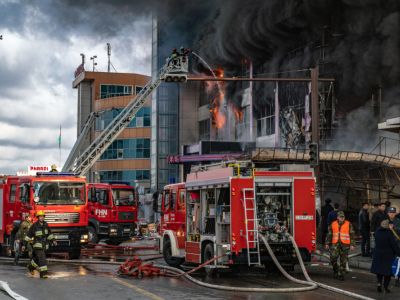Islamic scholars from across Afghanistan were to meet in Kabul Tuesday to decide whether to extradite Osama bin Laden, wanted "dead or alive" by the United States for last week's terrorist attacks in New York and Washington.
The decision to put the fate of bin Laden in the hands of some 1,000 ulema, or scholars, was announced after a high-level Pakistani delegation held talks with Taliban leader Mullah Mohammad Omar in the southeastern city of Kandahar.
A team led by Pakistan's intelligence chief spent three hours on Monday talking to the reclusive leader of Afghanistan's Islamic fundamentalist regime at his base in Kandahar, where the Saudi-born bin Laden also has a home.
US President George W. Bush on Monday invoked the language of the Wild West to threaten bin Laden, who the Taliban consider an "honored guest" and whose extradition they have rejected in the past.
"I want justice. There's an old poster out west that says, as I recall, 'Wanted dead or alive,'" Bush said during a visit to the Pentagon, which was severely damaged in the September 11 suicide attacks which also destroyed the World Trade Center in New York and left some 6,000 people dead.
A Pakistan spokesman said the delegation had carried a letter from President Pervez Musharraf to Omar, who reportedly counts bin Laden's eldest daughter as one of his wives and has dismissed US allegations against the Islamic militant.
"He (Musharraf) has advised the Taliban leadership to act with prudence because the life of the Afghan people is at stake," the Pakistani government spokesman said.
"We are hopeful they will listen to reason," he said, adding: "A breakthrough is not entirely unlikely."
Taliban spokesman Abdul Hai Mutmaen said any fatwa, or religious edict, handed down by the ulema would be fully implemented.
"Afghans have always sought fatwa on all crucial matters in the past," he told the Pakistan-based private news agency, Afghan Islamic Press (AIP).
"Now in the present situation a fatwa from the ulema is important and essential and the government will fully implement it.
"At the moment we are 60 percent hopeful the situation will become normal," Mutmaen added. "Both sides (at Monday's talks) totally agreed on the need to end the current misunderstanding between Afghanistan and the United States."
Fears of US retaliatory strikes have seen tens of thousands of Afghans flee their homes in recent days.
The UN refugee agency said half the population of the southern Taliban stronghold of Kandahar, some 100,000 people, had fled and people were on the move in other parts of the country.
Zmarrud Gul, a student from Jalalabad in eastern Afghanistan who passed into Pakistan Monday, said he saw signs the militia was on a war-footing.
"There is unusual movement of tanks and military vehicles on roads in Jalalabad, which indicates the Taliban are preparing for war," he said.
The Taliban has closed Afghan airspace to all flights.
China has closed its borders with Pakistan and Afghanistan, following a similar move by Iran last week. To the north, Russia has placed troops in Tajikstan on high alert.
Bin Laden, a veteran of Afghan resistance to the 1979-1989 Soviet occupation, has been living in Afghanistan since 1996 under the protection of the Taliban.
The Taliban has refused repeated requests to extradite him and insists the United States has not provided any credible evidence linking him to last week's attacks or the 1998 bombing of two US embassies in Africa, for which he has been indicted by a US court.
Pakistan is one of only three countries which recognize the Islamic regime and has been accused of providing the Taliban with training, advice, weapons and supplies.
But President Musharraf has promised Washington his "unstinted cooperation" in the war against terrorism, starting with efforts to catch bin Laden -- KABUL (AFP)
© 2001 Al Bawaba (www.albawaba.com)









